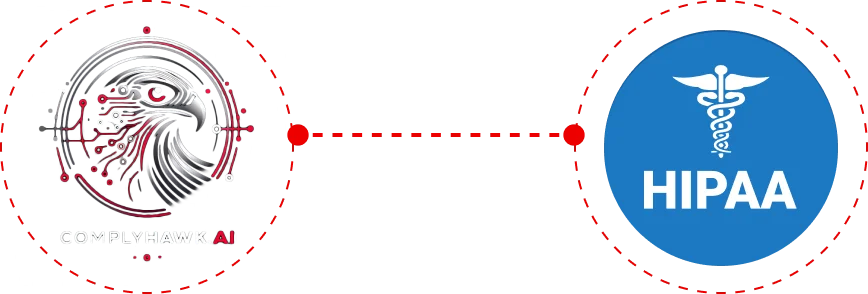- Solutions
By Company
By Industry
- Partners
- About Us
- Contact Us
Streamline Your Path to HIPAA Certification
A concise description that explains how the service simplifies and streamlines the complex process of achieving and maintaining HIPAA compliance, emphasizing the ease and efficiency brought by automation.

Our Team Has Worked with Clients at





What is HIPAA?
Preserving the confidentiality of patients’ personal data is not only a legal imperative in the healthcare field, but also a vital element for maintaining trust and delivering superior care. HIPAA, or the Health Insurance Portability and Accountability Act, is a U.S. legislation that establishes the requirements for safeguarding sensitive patient details. Although HIPAA primarily targets the U.S., its principles are increasingly significant for healthcare organizations worldwide, including those in the Middle East. For CISOs (Chief Information Security Officers), grasping the essence of HIPAA is crucial to ensure their organization’s healthcare information is secure and in line with global best practices.

What's Included With HIPAA
All-in-One Platform for Your HIPAA Needs
Real-Time Monitoring
Stay compliant with 24/7 oversight and full visibility into your HIPAA status.
Policy Management Hub
Streamline your documentation and policy management with over 20 editable, auditor-approved templates.
Automated Asset Tracking
Maintain an accurate inventory of all physical and virtual assets within your organization.
Risk Evaluation Tools
Conduct self-assessments to efficiently monitor and report on your security program’s effectiveness.
Vendor Management System
Centralize the management of vendor security assessments, including questionnaire handling and reviews.
Expert Support Access
Get real-time assistance from compliance experts and former auditors via live chat.
Frequently Asked Questions
While HIPAA is a U.S. rule, its principles are increasingly relevant to healthcare providers in the Middle East, especially those that handle the health data of U.S. citizens or collaborate with U.S.-based organizations. Adopting HIPAA’s standards can enhance the security and privacy of patient data, improve compliance with international best practices, and facilitate partnerships with global healthcare organizations.
Implementing HIPAA in the Middle East can pose challenges due to differing regulatory environments, cultural norms, and technological infrastructure. For instance, healthcare providers may need to invest in upgrading their IT systems to meet HIPAA’s technical safeguards, like encryption and audit controls. Furthermore, CISOs must ensure that their organization’s policies and procedures align with both HIPAA and local regulations, necessitating a nuanced approach.
Telehealth and digital health technologies offer immense benefits, but they also introduce new risks related to the security and privacy of health data. HIPAA provides a frame of reference for managing these risks by requiring that ePHI be safeguarded through access controls, encryption, and audit trails. For healthcare providers in the Middle East, implementing HIPAA’s safeguards can help ensure that telehealth platforms and digital health solutions are secure and compliant with international standards.
As healthcare providers increasingly transition to cloud-based solutions for storing and managing health data, HIPAA’s guidelines become even more pivotal. HIPAA necessitates that ePHI stored in the cloud is protected through robust encryption, access controls, and audit mechanisms. Moreover, organizations must ensure that their cloud service providers are HIPAA-compliant and enter into a Business Associate Agreement(BAA) that delineates their duties for protecting ePHI.
Compliance with both HIPAA and local norms requires a strategic approach that combines the requirements of both frameworks. CISOs should conduct a thorough assessment of their organization’s current practices, identify gaps, and put into place controls that meet the highest standard of both HIPAA and local laws. This might involve updating policies and procedures, investing in technology up-gradation, and providing training to staff on the specific requirements of both HIPAA and local norms.
Compliance with both HIPAA and local norms requires a strategic approach that combines the requirements of both frameworks. CISOs should conduct a thorough assessment of their organization’s current practices, identify gaps, and put into place controls that meet the highest standard of both HIPAA and local laws. This might involve updating policies and procedures, investing in technology up-gradation, and providing training to staff on the specific requirements of both HIPAA and local norms.
Ready to Simplify Your HIPAA Compliance?
Experience the ease of managing your HIPAA certification with our all-in-one platform. Get started today to streamline your compliance, enhance your security posture, and stay ahead of the curve.
